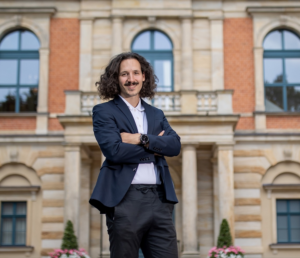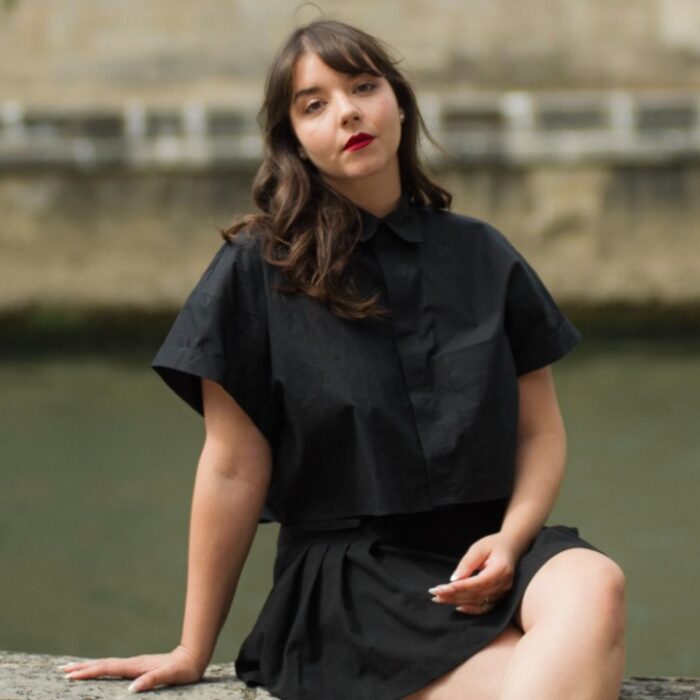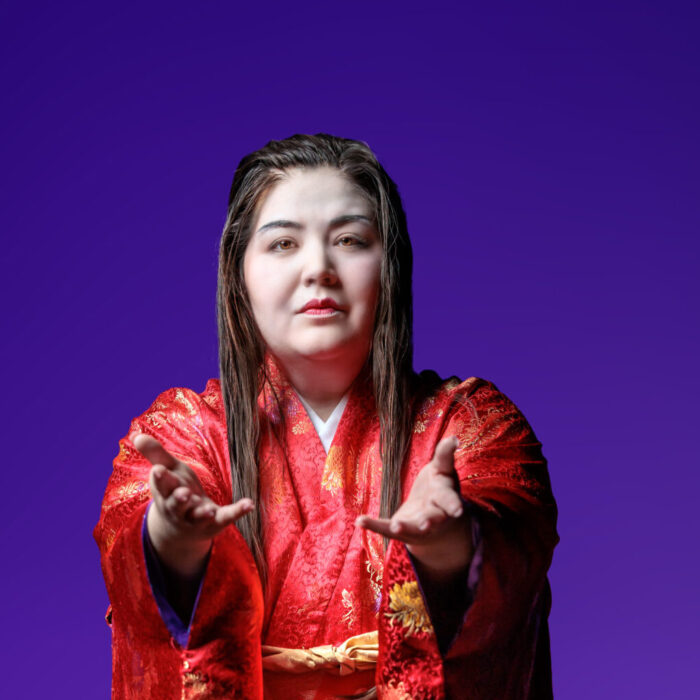
Q & A: Valentin Schwarz on the Bayreuth Festival’s ‘Ring Cycle’
By Christina Waters(Credit: Daniel.Karmann)
At the age of 33 Vienna-based Valentin Schwarz designed and directed a controversial staging of Wagner’s “Der Ring des Nibelungen,” which for the past four years has been featured at the celebrated Bayreuth Festival. This August 2025 marks Bayreuth’s final performance of Schwarz’s “Ring.” Starting in the autumn, he becomes artistic director of the Deutsches Nationaltheater and Staatskapelle in historic Weimar, in collaboration with his longtime colleagues Dorian Dreher as opera director and Timon Jansen as drama director.
OperaWire: Will it be difficult to say goodbye to this “Ring?”
Valentin Schwarz: Yes, but it’s time to part. Most directors tend to stay onsite for a little while, maybe the first season, maybe some part of the second season, and then life goes on. But here it was important to stay, because it’s such a big piece with so many people, such a big family of actors. So I wanted to stay and see the development of this family. I’m very glad to have stayed part of the journey with the singers, with the conductors, this year, and again with Simone Young, watching the process mature.
This last season we have different feelings [to what we had] in the beginning: maybe less excitement, but more reassurance about what we do. It’s been very, very cozy, with all the close connections that we’ve developed.
OW: Was there much workshopping between the first season and what we will see in August this year?
VS: I would say so, yes. We invented a quite hermetic concept, a sealed setting for the “Ring.” So, we won’t have a big visual difference, as if we changed the whole setting. Because it would not be possible to change the plot without destroying the whole. But within these rules, these settings that we created in dialog with Wagner, there are now different sub-rules, so to speak. Getting more and more detail into even single actions or single glances [between] the actors… It may seem subtle to some, and I have my view as director of course, but I also can say that many people that I’ve spoken with who have seen this “Ring,” year after year, have realized how strong these gestures and connections have become. These people on the stage have more than the usual six weeks to spend with each other: [they] have now spent a few years with each other!
OW: What do you think has enabled you to take on something so monumental as Wagner’s “Ring?” What allowed you to have the nerve to take this on at such a young age?
VS: I always find it so hard to describe my own abilities. But my former teacher was [introducing] me recently and describing my years in university, and she used a quite interesting term: fearlessness. And I would say that the other side of that same coin is curiosity, because I think art has always do with the unknown. To explore, to explore new works of art, to explore new approaches, to explore new concepts. As an artist you can’t be afraid. It’s important to keep on exploring, to not get to a final point. Art is never finished. We don’t have a fixed way that we see the world and we see the interactions of human beings. It’s always improving and always evolving, and therefore it was just a big sense of curiosity which led me to this point. I wanted to see how it could work.
I have told students that there will be no point where you will think, ‘Oh, I am able to do this. I have all the skills that are necessary.’ There will be no point, but [there] will always be a doubt and the feeling of not being enough or sometimes like an imposter: dark moments, so to say. But in the bright moments, you realize that you’re exploring something which only a few people in the world will get to explore.
OW: The “Ring” continues to draw us into it. There’s always more to find. Is this something that is especially true of Wagner? Did you find it true of Mozart or Verdi or Puccini as well?
VS: I think in Wagner we have the very, very special phenomenon of a kind of work, especially the “Ring,” which is so immense and based not only in the music and the story, but also in the construction of thoughts which lie underneath. It always offers a mass of contradictions: a big mass of aspects which, when you look closely enough, you will see do not fit with each other. This world itself is rather contradictory.
And of course, many, many scholars of Wagner have tried to to avoid these contradictions, to try to make the “Ring” complete. However when you realize the different sources of the “Ring,” it is not possible to resolve these contradictions. And this is its richness. And this richness is a problem, because as a director you’re required to provide an evening of opera which has to be in some sense complete.
So you make decisions. You must reduce the complexity of the world, because you have to make an evening… Still, I think that especially with Wagner his work reflects the contradictions of our very world in which we live. [One sees in Wagner] aspects of our world, which is in many ways falling apart, where opinions are not able to be discussed, where we feel in conflict when we talk about the perception of reality. Wagner’s works really fit this feeling of incompleteness and uncertainty and yet we have, of course, the leitmotifs and the incredible structure which holds everything together. So it’s a mirror to our world. It’s a mirror to our uncertainties and contradictions. But the mirror is not only reflecting, it’s also creating a bright light of musical coherence and sense.
In some sense this is religion. It’s the feeling of hope, which Wagner also talked about, which art, in the end, can give to us. And this is the very big reason for the obvious fact that we are only putting little stones on the mosaic of Wagner: as I have said before, I feel myself placing only one piece into the whole.
OW: I know a lot of people were irritated by your innovations: the substitution of the quest for youth in place of a golden Ring. And making Hagen a heroic figure leading us into the future. Can you talk about the freedom that the Festival gave you in creating your production?
VS: I can only speak about my own experience there but I think that Katharina Wagner made a bold decision in giving me the direction of the “Ring.” I believe I am the 13th director to receive this honor of directing the “Ring.” She was making a point, and she kept with this bold decision from the very beginning. You can always talk about the creativity of artists and how new art and new concepts can be shaped. But in the end, there are structural requirements for making art free and bold. People who believe in you, yes, but also people who give you the possibility and financial means.
I believe it is a very big mistake to think that artists can make art by themselves. That is extremely wrong, because arts and artists only can live and create in a world which creates opportunities and the openness and the boldness to create art, because art is not about itself. Art is about the society. Society has to provide the room for art, therefore Bayreuth is a permanent example, where this very thought has taken place for 150 years. We need to remind ourselves that, in the end, if we talk about arts, it is always about getting the opportunities to create art and make great art. Some art is cheaper, less expensive to create than others, and opera is notoriously costly because it is so big and it must be so big.
OW: What do you say to passionate artists making opera in smaller halls with smaller ensembles?
VS: You can make art without hundreds of people. You can even make opera art with two people and some candlelight. Nothing is better or worse. It’s just the wealth of what we can call culture. It is also important to note how the big events are not only big and expensive, but they also offer the possibility for many people to connect, to communicate in a very, very big, public manner. Today we are each quite separate. Everybody has his cellphone, everybody has his own world, his own bubble, his own quasi monolog where you kind of repeat your own opinion, and you only [get back] the things that you are giving to the internet or something… A very, very lonely discussion.
But in these large events [such as the Bayreuth Festival] there is an atmosphere of many, many people having many very different opinions about something. In the most non-destructive way possible we discuss these ideas, because we are not talking about politics and we’re not talking about how one has to suffer because of someone or other, but it’s about art: the vision of something which we can change or at least discuss. This is especially true of Bayreuth and large-scale places where we have many, many different people coming together from all the parts of the world. It’s one of the best experience that I know.
OW: Your concept of the future in the “Ring” was both grim and yet hopeful. Where does the future take you?
VS: I was always in state of productivity and always thinking about the next project, which is very much the kind of thing artists do: move toward the next piece. Here in a specific opera house, you are a guest. There’s a structure and you come here and you have some weeks to perform. You have the great moments with the singers, with the conductor, with the musicians. Then there’s the premiere and you leave. It’s finished, you have to push the bird out of the nest.
I’ve seen that in many ways we need to change the atmosphere of how we work in the theater, in the arts, because there has been such dominance of very authoritative structures. There is a general director, a director and so on, very hierarchical. That has been historically important, but in many ways it can also create toxic communication. As a director I’m always working with the ensemble, how to create the best and most creative atmosphere in a piece I direct, but then I have to leave and I don’t know if anything has will have changed in the theater.
Now my long-time colleagues and I will direct theater in Weimar—famous for Goethe and Schiller. It is interesting, it has opera and so many theaters, spoken theater, spoken drama, big orchestras… And a very rich tradition of culture. And there we will be general directors for the next few years. I will still direct pieces, of course, but now we also work on how we can influence and maybe have the possibility to improve [in some way] the structure of the theater and arts, and give all the other people the possibility to create art, to create new ways of how we can see the world.
OW: Will you do new operas—that is, operas by living composers—as well as some traditional?
VS: Weimar is a place of tradition with a big cultural background, so I think Weimar is the only place where the issue is not if we will do traditional operas, but only how we will be making them. There are many different approaches now. We have living composers who are able to create the piece by themselves, but also to make a dialog with the classics in a kind of combination. How do they speak with each other? Because art is about dialog. It’s about the wealth of the vision and the view from the present. To make this dialog visible is not only about directing but about creating the roles with the music. We want to create evenings where we can make this process visible.



